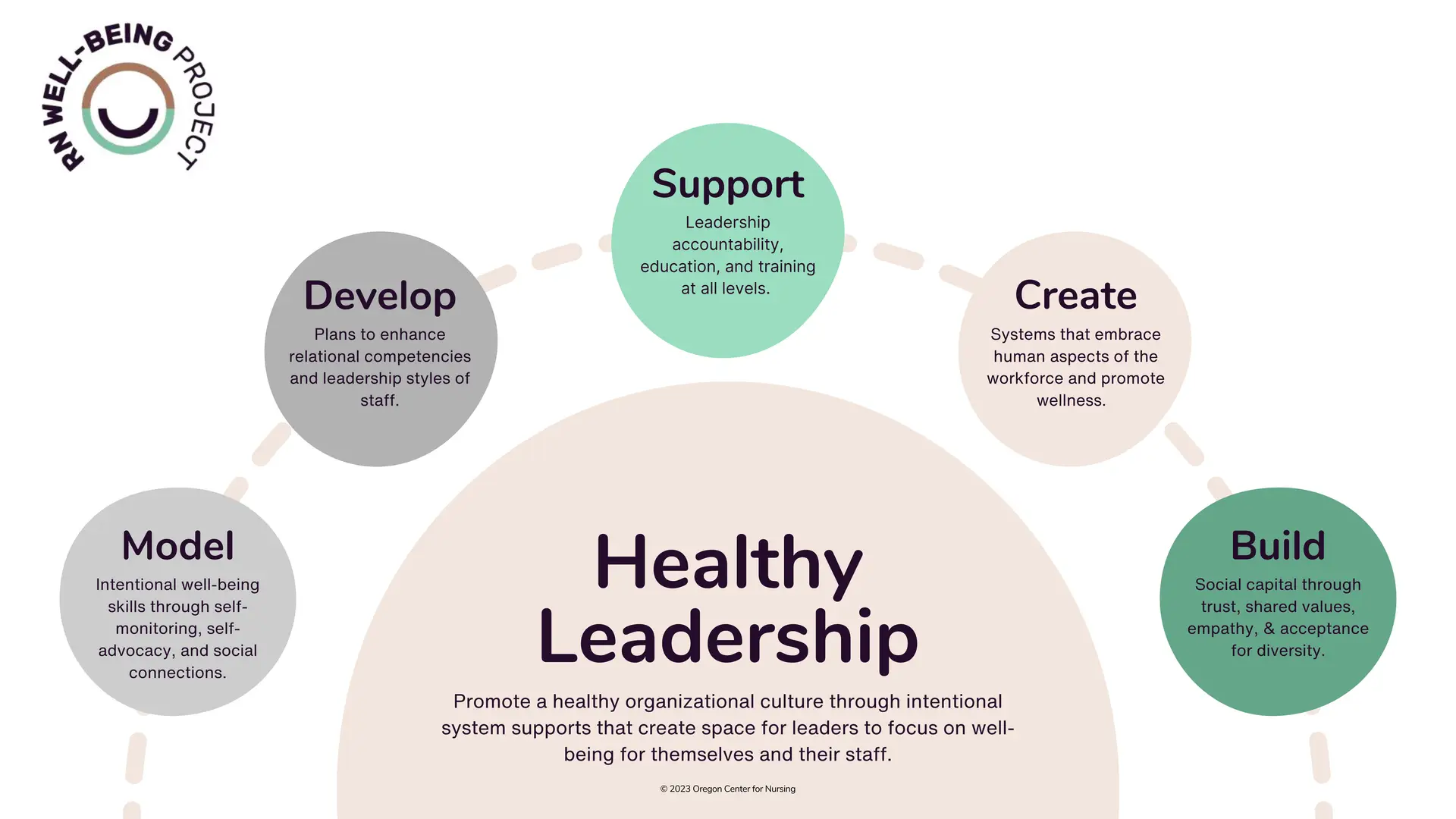Click the topics below for actionable strategies to address this domain 🔽
Leaders play an essential role in humanizing the workplace. One such way is to build social capital through empathetic communication and compassionate action. (1,2)
Nurses would benefit from leaders who:
- Show patience and acceptance for diversity (2,3)
- Show sincere consideration for others as humans beings with specific needs (2)
- Value the individual person (3)
- Lead with empathy and compassion (3)
- Actively listen to concerns without judgement or bias (3,4)
- Encourage staff to utilize their personal abilities (3)
- Show respect and understanding (3)
- Find solutions to problems through collaboration (3)
- Consistently Recognize individual contributions (3)
- Focus on efficiency, rely on evidence, and are transparent (3)
- Demonstrate a genuine focus on the well-being of others (2)
- Build an inclusive community with social engagement. (2)
Leaders who build social capital, build trust and credibility. (2)
References:
- Hofmeyer, A., & Taylor, R. (2020, October 15). Strategies and resources for nurse leaders to use to lead with empathy and prudence so they understand and address sources of anxiety among nurses practising in the era of COVID‐19. Journal of Clinical Nursing, 30(1–2), 298–305. https://doi.org/10.1111/jocn.15520
- Xu, J. M., Stark, A. T., Ying, B. H., Lian, Z. M., Huang, Y. S., & Chen, R. M. (2022, June 13). Nurses’ Workplace Social Capital and the Influence of Transformational Leadership: A Theoretical Perspective. Frontiers in Public Health, 10. https://doi.org/10.3389/fpubh.2022.855278
- Sihvola, S., Kvist, T., & Nurmeksela, A. (2022, May 2). Nurse leaders’ resilience and their role in supporting nurses’ resilience during the COVID‐19 pandemic: A scoping review. Journal of Nursing Management. https://doi.org/10.1111/jonm.13640
- Hughes, M. T., & Rushton, C. H. (2022, February 23). Ethics and Well-Being: The Health Professions and the COVID-19 Pandemic. Academic Medicine, 97(3S), S98–S103. https://doi.org/10.1097/acm.0000000000004524
Leaders are responsible for their staff experiences, roles, and well-being. As such, leaders can:
- Be acutely aware of the physical and mental well-being of every single employee. (1)
- Work alongside staff to identify and address well-being challenges. Staff should be given a safe space to express concern and discuss personal and work-related factors that inhibit their well-being. (1,2)
- Know their staff on a human level to be able to identify when performance factors, moods, character, or demeanor could be askew and provide opportunities for supportive discussion. (3)
- Help staff in navigating the loss of routine, familiarity, certainty in the future, health, patients/clients, or loved ones through grief leadership. (3)
- Include staff in deciding resource options to pick meaningful, feasible, and useful choices that staff would adopt (4)
- Promote autonomy, personal and professional growth, and physical and mental well-being. (2)
- Establish occupational safety as a priority. (2)
- Value the human aspects of the workforce and recognize the unique contributions of each employee. (1)
References:
- Markey, K., Ventura, C. A. A., Donnell, C. O., & Doody, O. (2020, November 6). Cultivating ethical leadership in the recovery of COVID‐19. Journal of Nursing Management, 29(2), 351–355. https://doi.org/10.1111/jonm.13191
- Irshad, M., Majeed, M., & Khattak, S. A. (2021, June 21). The Combined Effect of Safety Specific Transformational Leadership and Safety Consciousness on Psychological Well-Being of Healthcare Workers. Frontiers in Psychology, 12. https://doi.org/10.3389/fpsyg.2021.688463
- Morganstein, J. C., & Flynn, B. W. (2021, March 11). Enhancing Psychological Sustainment & Promoting Resilience in Healthcare Workers During COVID-19 & Beyond. Journal of Occupational &Amp; Environmental Medicine, 63(6), 482–489. https://doi.org/10.1097/jom.0000000000002184
- Hughes, M. T., & Rushton, C. H. (2022, February 23). Ethics and Well-Being: The Health Professions and the COVID-19 Pandemic. Academic Medicine, 97(3S), S98–S103. https://doi.org/10.1097/acm.0000000000004524
Organizations are responsible for their leaders’ effectiveness and staff’s well-being. Organizations are encouraged to demonstrate that they support and value leaders at all levels by incorporating healthy leadership modeling, development, onboarding, as well as ongoing coaching and training into the strategic plan to prioritize leader health and succession planning. (1,2)
Leaders would benefit from:
- Peer support, mentors, and coaches (1)
- A library of tools, interventions, and ideas to build and support a healthy culture. (3)
- Resources to develop leadership competencies (1)
- Assistance in understanding their role in nurturing culture (4)
- Opportunities to practice challenging situations (4)
- Protected time to participate in professional development (5)
- Sanctioned time for their wellness (5)
References:
- Medeiros, M. (2022, June). Nurse manager succession planning for unit health and well-being. Nursing Management, 53(6), 41–43. https://doi.org/10.1097/01.numa.0000831436.38442.a8
- Pappas, S. (2021, July). The Role of Nurse Leaders in the Well-being of Clinicians. JONA: The Journal of Nursing Administration, 51(7/8), 362–363. https://doi.org/10.1097/nna.0000000000001029
- Bernard, N. (2019, February). Resilience and Professional Joy: A Toolkit for Nurse Leaders. Nurse Leader, 17(1), 43–48. https://doi.org/10.1016/j.mnl.2018.09.007
- Markey, K., Ventura, C. A. A., Donnell, C. O., & Doody, O. (2020, November 6). Cultivating ethical leadership in the recovery of COVID‐19. Journal of Nursing Management, 29(2), 351–355. https://doi.org/10.1111/jonm.13191
- Warshawsky, N. E., Caramanica, L., & Cramer, E. (2020, April 9). Organizational Support for Nurse Manager Role Transition and Onboarding. JONA: The Journal of Nursing Administration, 50(5), 254–260. https://doi.org/10.1097/nna.0000000000000880
Organizations are recommended to encourage leaders and staff at all levels to continually strive to develop their leadership skills and competencies. Doing so increases current leaders’ ability to lead effectively as well as allows future leaders to grow into the pipeline. Some considerations to adopting this strategy include:
- Strategic succession planning (1)
- Identify and train the desired skills and styles (1)
- Ongoing mentoring and coaching (1,2,3)
- Refresher training as planned development (4)
- Shift desired competencies with industry changes, when relevant (5)
- Relationship building (1,2)
- Use simulation and other modalities in training (3)
- Offer financial support to staff for degree advancement (3)
- Collect qualitative and quantitative data to measure return on investment (3)
Leaders at all levels should be aware of their leadership characteristics and how others are impacted by their decisions. Relational leadership styles (transformational, authentic, servant, and ethical leadership) have shown better outcomes in healthcare settings in fostering healthy work environments, job satisfaction, and retention. Safety-specific transformational leadership was shown to increase psychological well-being for high-risk occupations, including healthcare. (2,4,6,7)
References:
- Medeiros, M. (2022, June). Nurse manager succession planning for unit health and well-being. Nursing Management, 53(6), 41–43. https://doi.org/10.1097/01.numa.0000831436.38442.a8
- Markey, K., Ventura, C. A. A., Donnell, C. O., & Doody, O. (2020, November 6). Cultivating ethical leadership in the recovery of COVID‐19. Journal of Nursing Management, 29(2), 351–355. https://doi.org/10.1111/jonm.13191
- Warshawsky, N. E., Caramanica, L., & Cramer, E. (2020, April 9). Organizational Support for Nurse Manager Role Transition and Onboarding. JONA: The Journal of Nursing Administration, 50(5), 254–260. https://doi.org/10.1097/nna.0000000000000880
- Sihvola, S., Kvist, T., & Nurmeksela, A. (2022, May 2). Nurse leaders’ resilience and their role in supporting nurses’ resilience during the COVID‐19 pandemic: A scoping review. Journal of Nursing Management. https://doi.org/10.1111/jonm.13640
- Bernard, N. (2019, February). Resilience and Professional Joy: A Toolkit for Nurse Leaders. Nurse Leader, 17(1), 43–48. https://doi.org/10.1016/j.mnl.2018.09.007
- Irshad, M., Majeed, M., & Khattak, S. A. (2021, June 21). The Combined Effect of Safety Specific Transformational Leadership and Safety Consciousness on Psychological Well-Being of Healthcare Workers. Frontiers in Psychology, 12. https://doi.org/10.3389/fpsyg.2021.688463
- Xu, J. M., Stark, A. T., Ying, B. H., Lian, Z. M., Huang, Y. S., & Chen, R. M. (2022, June 13). Nurses’ Workplace Social Capital and the Influence of Transformational Leadership: A Theoretical Perspective. Frontiers in Public Health, 10. https://doi.org/10.3389/fpubh.2022.855278
Leaders, including direct managers, are encouraged to model and become proficient in wellness practices, growth principles, and leadership qualities to establish professional norms. Such modeling could include: (1)
- Relational competencies (communication skills, approachability, empathy, visibility, etc.) (2)
- Advanced resilience skills (self-monitoring, decompression activities, self-advocacy, social connections, etc.) (3,4)
- Ethical and safety promoting qualities (5)
- Cognitive reframing, vulnerability, desire to develop self, embrace challenges, and welcome feedback (6)
Once leaders have developed their own capacity to consistently model intentional well-being through these practices, principles, skills, and qualities, they can inspire and empower others to create more functional supportive work environments. (4,6)
References:
- Hughes, M. T., & Rushton, C. H. (2022, February 23). Ethics and Well-Being: The Health Professions and the COVID-19 Pandemic. Academic Medicine, 97(3S), S98–S103. https://doi.org/10.1097/acm.0000000000004524
- Medeiros, M. (2022, June). Nurse manager succession planning for unit health and well-being. Nursing Management, 53(6), 41–43. https://doi.org/10.1097/01.numa.0000831436.38442.a8
- Morganstein, J. C., & Flynn, B. W. (2021, March 11). Enhancing Psychological Sustainment & Promoting Resilience in Healthcare Workers During COVID-19 & Beyond. Journal of Occupational &Amp; Environmental Medicine, 63(6), 482–489. https://doi.org/10.1097/jom.0000000000002184
- Bernard, N. (2019, February). Resilience and Professional Joy: A Toolkit for Nurse Leaders. Nurse Leader, 17(1), 43–48. https://doi.org/10.1016/j.mnl.2018.09.007
- Irshad, M., Majeed, M., & Khattak, S. A. (2021, June 21). The Combined Effect of Safety Specific Transformational Leadership and Safety Consciousness on Psychological Well-Being of Healthcare Workers. Frontiers in Psychology, 12. https://doi.org/10.3389/fpsyg.2021.688463
- Markey, K., Ventura, C. A. A., Donnell, C. O., & Doody, O. (2020, November 6). Cultivating ethical leadership in the recovery of COVID‐19. Journal of Nursing Management, 29(2), 351–355. https://doi.org/10.1111/jonm.13191


